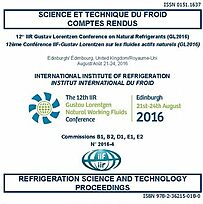
Résumé
This paper discusses the selection of appropriate ammonia-based working pairs as well as the performance estimation for the hybrid absorption/thermochemical refrigeration cycle that we recently proposed. This system requires a low-grade heat source, especially by solar thermal collector, and combines an absorption continuous cycle with a thermochemical discontinuous cycle, to combine the former’s better performance with the latter’s high energy density of storage with negligible heat losses. In the hybrid system, both subcycles share the same refrigerant fluid (ammonia), condenser and evaporator, but have different sorbent pairs. For selected evaporation temperatures between -10 ºC and 10 ºC and condensation temperatures between 20 ºC and 30 ºC, we carry out a parametric study of the system and identify some suitable working pairs. In addition, we estimate, for demand profiles typical of refrigeration applications, the cycle’s Coefficient Of Performance (COP), and compare these values when different working pairs are used.
Documents disponibles
Format PDF
Pages : 8 p.
Disponible
Prix public
20 €
Prix membre*
Gratuit
* meilleur tarif applicable selon le type d'adhésion (voir le détail des avantages des adhésions individuelles et collectives)
Détails
- Titre original : Solar-driven hybrid absorption-thermochemical refrigeration systems: performance estimation.
- Identifiant de la fiche : 30019146
- Langues : Anglais
- Source : 12th IIR Gustav Lorentzen Conference on Natural Refrigerants (GL2016). Proceedings. Édimbourg, United Kingdom, August 21st-24th 2016.
- Date d'édition : 21/08/2016
- DOI : http://dx.doi.org/10.18462/iir.gl.2016.1063
Liens
Voir d'autres communications du même compte rendu (140)
Voir le compte rendu de la conférence
Indexation
-
Experimental study on a solar-powered thermoche...
- Auteurs : WU S., LI T. X., WANG R. Z.
- Date : 11/07/2016
- Langues : Anglais
- Source : 2016 Purdue Conferences. 16th International Refrigeration and Air-Conditioning Conference at Purdue.
- Formats : PDF
Voir la fiche
-
AN INSIGHT INTO ABSORPTION REFRIGERATION MACHINES.
- Auteurs : VICATOS G.
- Date : 23/04/1990
- Langues : Anglais
Voir la fiche
-
Various physical properties of a working liquid...
- Auteurs : NEMOTO Y., NODA H., NODA M., et al.
- Date : 17/02/2010
- Langues : Anglais
- Source : Measures to address climate change. 2010 International Symposium on Next-generation Air Conditioning and Refrigeration Technology: February 17-19, Tokyo, Japan.
- Formats : PDF
Voir la fiche
-
Absorption technology for cold storage.
- Auteurs : CAO W., LU Z., FU D., et al.
- Date : 24/09/2002
- Langues : Anglais
- Source : Proceedings of the International Sorption Heat Pump Conference.
Voir la fiche
-
Solar cooling and heating system optimization f...
- Auteurs : INAGAKI M., YAMADA Y., ISHIDA K.
- Date : 07/08/2017
- Langues : Anglais
- Source : International sorption heat pump conference, ISHPC 2017, Tokyo august 7-10.
Voir la fiche
